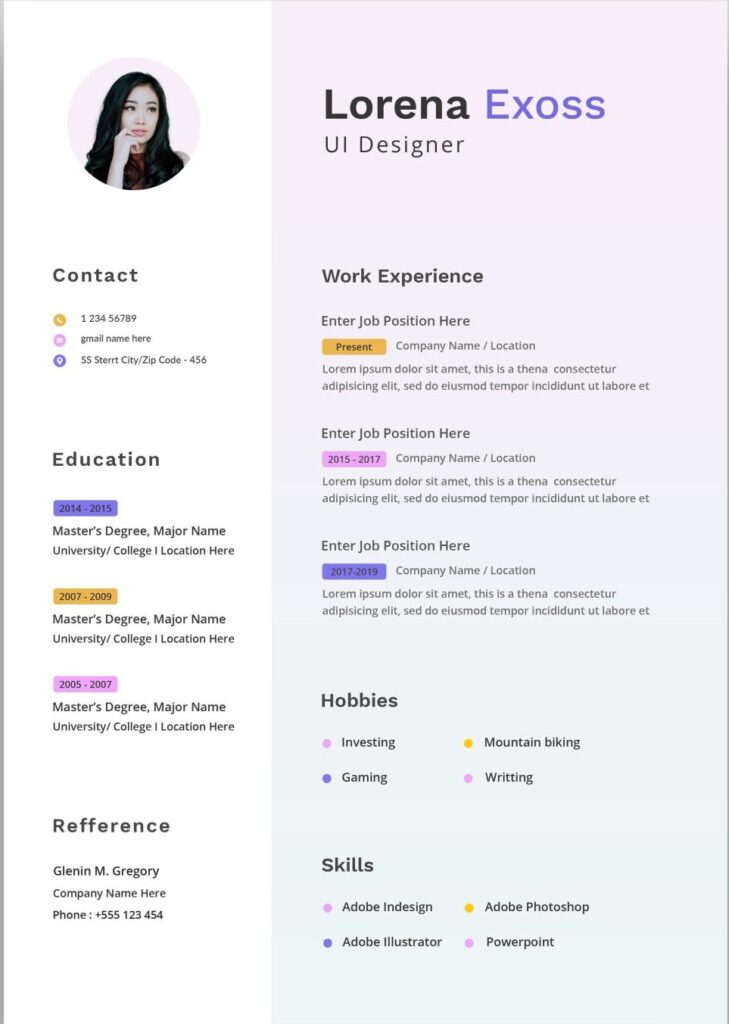
There are some personal details which must be included on your CV. These basics are:
Full name
Address
Contact information (this should be a personal telephone number and email address, ensure you’re email address is an appropriate one)
You may wish to include your date of birth if you think this will help you but it is not necessary
You may wish to make a note of your mobility on your CV for a number of reasons. Depending on the position you are applying for, it could work to your advantage if you say that you have a car or live close to a main transport network. This section is not always necessary so it is up to you to decide whether it is important for you, or if you want to use that space to extend another section.
This section depends a lot on what situation you yourself are in. But as a rule, education should be arranged in chronological order, the latest achieved qualification being at the top. Here is a breakdown of what to emphasise depending on where you are with your education:
If you’ve just graduated from school – detail your GSCEs and A-Levels and any other education or achievements you have. The jobs you may be applying for likely won’t ask for much work experience, so detailing achievements in education is a strong point at this stage.
If you have graduated from university – as a recent graduate, your degree will probably be the most important thing on your CV, so education will come before work experience on the page. List your GSCEs and A-Levels but in less detail than the above, rather stating the number of subjects and grades only. If you have taken any modules at University that are in line with the role you are applying for, you might want to detail these a little more than usual.
If you are still in education it is a good idea to include the dates when you expect to receive your grades, or even what your predicted grades are if you have them.
If you have completed a professional qualification – it is still important to detail previous education to allow the recruiter to see how you have professional developed current skills.
If you have been employed for a long time without taking qualifications – you will probably have a wealth of work experience behind you. It is important to still list the education you have, but you needn’t go into great detail, condense this information and use the extra space to detail relevant work experience.
Show your potential employer the best aspects of your work history by tailoring those roles to your application. Try to emphasise relevant skills you have developed that may be necessary in the job you are applying for. Here are some things to keep in mind while detailing your work history:
Draw parallels between you previous jobs and the one you are applying for. Highlight transferable skills to show how well you could adapt to the situation.
Use facts and figure where possible to prove the ways in which you have a beneficial impact on the company (an increase in revenue or an industry award, for example).
Read through the job specification and find out what experience and skills are wanted. Treat these points as if they are questions and try to answer them with examples of how you are capable of fulfilling that need. Include these in your work experience in a natural way so that the employer can see you are a good match for the job.
If you have done any voluntary work that is relevant to you application, you should include this. Employers can percieve these extracurricular activities in a positive light, seeing you as a passionate and proactive person.
The specific personal skills you include will be greatly affected by who you are and the job you are applying for, but these are some of the areas that should be covered generally:
Communication
Working in a team/management
Taking initiative/leadership
Time management and prioritising
Planning/organisation skills
Good work ethics
You needn’t include references on your CV or provide them at this stage. A potential employer will request references from you at the point of giving you a conditional offer. Most companies will ask for two references, however sometimes you may be asked to provide three, so it’s good to have an extra one on reserve if it is needed. You do need to ask the persons permission to use them as a reference and at this stage it’s best to aslo ask how they would prefer to be contacted and what contact information they are happy to have passed on. Any of the following can be a reference:
A previous employer – this is usually the best option when approaching a referring to a previous job as the manager or director will have the most credibility to the potential employer
A co-worker – if it is not appropriate to list your previous boss as a reference, a person you worked closely with is also a good option.
A teacher or tutor – if you have no previous work experience, a tutor who recently taught you is the next best person to have as a reference as they will be able to vouch for your education and skills.
A personal reference – although this should be used as a last resort, having a personal reference is much better than not being able to provide one. If you choose to use a personal reference, pick someone who will show you in a responsible proactive light, such as a volunteer you worked with or a member of a sports team you are involved with.
If you are interested in any vacancies on our website get in touch with us once you have your CV ready. If you have any questions at all we’re just a phone call away on 01706 418 223

